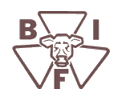General Session II
New Advancements in Genetics: Epigenetics
by Troy Smith for Angus Productions Inc.
HOUSTON, Texas (April 20, 2012) — The purpose of studying the bovine genome and developing DNA tests for various genetic traits is to provide more tools for managing cattle breeding. But on top of genetics, cattle breeders have to think about epigenetics. According to North Carolina State University geneticist David Threadgill, the prefix ‘epi-‘ actually means “on top of” or “attached to,” so epigenetics is the study of those things, in addition to genes, that can be inherited.

David Threadgill
“They can have pronounced effects on following generations,” said Threadgill, while addressing the 2012 Beef Improvement Federation (BIF) Research Symposium in Houston, Texas. Speaking during the symposium’s second general session, Threadgill said epigenetic effects involve the addition of molecules that affect gene expression without actually changing the DNA sequence. The presence of add-on enzymes, for example, could switch on or switch off certain genes. These effects can be passed to subsequent generations, causing phenotypic changes.
Inherited developmental or environmental effects represent a classic form of epigenetics, explained Threadgill. Such effects would include diet. He noted how, during World War II, pregnant women in Nazi-occupied countries suffered malnutrition, which affected the lifelong health of their children, and even their grandchildren, by predisposing them to certain diseases. Evidence also shows that the diets of young males can affect the eventual health and longevity of their children and grandchildren.
“Stress, as well, can have pronounced effects, as seen in women that were pregnant during the 9-11 attack,” added Threadgill. “Especially if they were in their third trimester, the experience affected their blood cortisol levels. Their offspring then tended to have higher cortisol levels and they may be more susceptible to post-traumatic stress syndrome.”
Threadgill said epigenetic effects in beef cattle include fetal programming, where the type and quality of a dam’s feed during gestation has been shown to affect body composition and feed efficiency of her calf. It’s possible, too, that epigenetic effects transmitted by sires used for artificial insemination could have broad impact. Consequently, researchers are trying to develop technology for epigenetic typing.
“We have to think about the potential effects, on subsequent generations, of how animals are fed, what they are fed and how they are handled,” said Threadgill. “It would help if we could find out what epigenetic marks an animal might have.”
Return to the Newsroom for links to the PowerPoint presentation that accompanied this presentation.
Editor’s Note: This summary was written under contract or by staff of Angus Productions Inc. (API). Through an agreement with the Beef Improvement Federation, we are encouraging reprinting of the articles to those who will adhere to the reprint guidelines available on this site. Please review those guidelines or contact Shauna Rose Hermel, editor, at 816-383-5270. PowerPoints are posted with permission of the presenter and may not be reproduced in whole or in part without the express permission of the presenter.
API's coverage of the event is made possible through collaboration with BIF and sponsorship of LiveAuctions.tv. For questions about this site, or to notify us of broken links, click here.
Headquartered in Saint Joseph, Mo., API publishes the Angus Journal, the Angus Beef Bulletin, the Angus Beef Bulletin EXTRA, and the Angus e-List, as well as providing online coverage of events and topics pertinent to cattlemen through the API Virtual Library.



